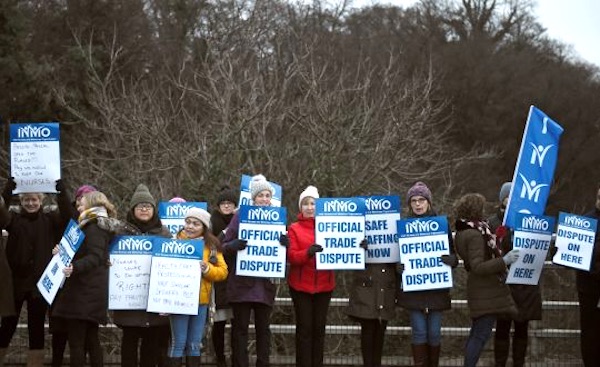
Some 40,000 nurses have gone on strike in the 26 Counties over salary scales that are believed to be the lowest among paid workers in Ireland with degree status.
Today’s strike is the first in a series of six 24-hour work stoppages being organised by the Irish Nurses and Midwives Organisation (INMO). It follows months of fruitless wrangling with the Dublin government over pay which is on average 7,000 euro less per annum than other comparable grades.
The strike began at 8am after the Labour Court decided not to intervene formally in the dispute last night. The government has argued that conceding that nurses are paid too little would end up “completely undermining” its budgetary position.
Minister for Finance and Public Expenditure Paschal Donohoe said agreeing to provide additional pay rises for nurses would “no doubt generate knock-on or “leapfrogging” claims from the rest of the public service workforce, where there are already other well-aired pay grievances”.
But the INMO said the government had not tabled any “realistic proposals” which could have headed off the strike. They said that increases are needed to tackle recruitment and retention problems in the health service which has led to many working extra hours to provide essential cover.
INMO director of industrial relations Tony Fitzpatrick said it was the largest strike in the history of the health service “and the government seemingly has nothing to say. We are always open for talks and to receive realistic proposals to end this dispute.”
Former Sinn Fein leader Gerry Adams, accompanied by local representatives, joined the nurses’ picket line at Our Lady of Lourdes Hospital in Drogheda.
Speaking at the picket to local journalists, Mr Adams said the strike was the responsibility of this and previous governments which had failed to properly address the ongoing recruitment crisis in the health service.
“Our nurses are the backbone of the health service. They work long hours, in often very difficult conditions. Their salary does not reflect their role and work load and professional training,” he said.
“The onus is on the government to break the current logjam. Empty words of sympathy and calls for nurses to return to the negotiating table from government Ministers are meaningless.”
People before Profit noted the Taoiseach Leo Varadkar and Minister for Health Simon Harris had showed “no difficulty” in finding an extra billion euro to fund the National Children’s Hospitals.
They said that the government “cannot recruit nurses because the pay does not cover the costs of rent, childcare and basic living in our major cities. Nurses are leaving the country because they are better paid elsewhere.”
![[Irish Republican News]](https://republican-news.org/graphics/title_gifs/rn.gif)
![[Irish Republican News]](https://republican-news.org/graphics/title_gifs/harp.gif)

